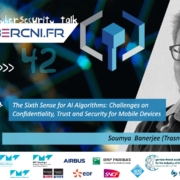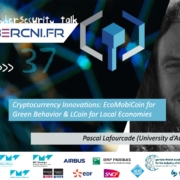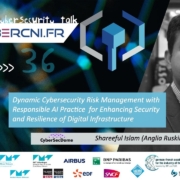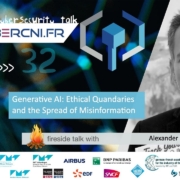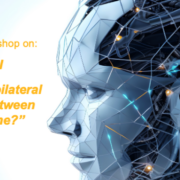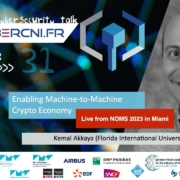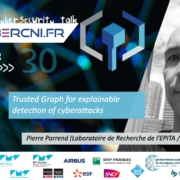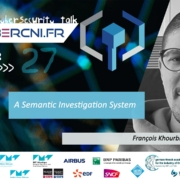[T42] The Sixth Sense for AI Algorithms: Challenges on Confidentiality, Trust and Security for Mobile Devices – Soumya Banerjee (Trasna)
On Fri, Jan 31th, 2025, 2pm CET, we welcome Soumya Banerjee (Trasna), for another edition of TALK.CYBERcni.fr on “The Sixth Sense for AI Algorithms: Challenges on Confidentiality, Trust and Security for Mobile Devices”. Share and join!
Explore the intricate challenges of protecting AI and machine learning models in hardware-assisted Trusted Execution Environments (TEEs). Soumya will delve into the vulnerabilities of modern mobile devices, from API extraction threats to intellectual property protection for ML models, including attacks targeting Graph Neural Networks and Large Language Models. Gain insights into cutting-edge strategies for safeguarding the confidentiality and security of AI models while addressing fragmentation, transparency, and interoperability in TEEs. Don’t miss this essential discussion for AI and mobile security innovators!
You are cordially invited to join the free live stream on youtube and LinkedIn! Please share the link https://talk.cybercni.fr/42 with your interested friends!
Trailer:
LinkedIN Event: https://www.linkedin.com/posts/2pahl_confidentiality-security-ai-activity-7276883814243520515-GsXM
Facebook Event: https://www.facebook.com/events/800560978874219/
Youtube: https://www.youtube.com/watch?v=2rj7Uvg4ckE&list=PLdftPKA9mTfaDJxqwexil2mPhUFIA9ITd
Stream redirect (for every edition): https://TALK.cyberCNI.fr/stream
Newsletter with invitations: Subscription on https://TALK.cyberCNI.fr
Help us spreading the news
The best talks are those with an interested diverse audience! Therefore, please use the following media to spread the news in your networks:
Thank you!
Abstract
The plethora of AI & ML algorithms have impacted different dimensions of use-cases while encompassing hardware and mobile communication devices as well. Hence,there are arguments how and how far the wide spread of AI/ ML algorithms could envisage Confidentiality of the algorithms and there embedded devices.
Significantly, since years Hardware-assisted trusted execution environments (TEEs) foster small pieces of trusted software on a holistic computing device to be distinguished from the rest of the software on the same device, including the OS and other applications. At present TEEs have become more ubiquitous. Almost every smartphone or tablet is likely to have a processor with TEE capabilities. Nevertheless, the availability of 3rd party App ( including AI)on each mobile devices also offers crucial challenges in protecting Intellectual Property associated with machine learning models, when the machine learning application needs to be distributed to the client with the ML model aggregated within it. However, already there exists potential attack vectors against TEEs and concerns relating to fragmentation, interoperability, and transparency. With Secured TEEs to protect AI/machine learning models can be trespassed through API extraction. Therefore, Confidentiality, trust and security of mobile devices can be compromised. This talk will usher substantial measures to protect the Confidentiality, trust and security of machine learning models for device oriented TEEs. The content will cover various ML model based attacks with respect to Graph Neural Networks, Large Language Model & Deep Learning and also certain progressive measures towards ownership resolution of the trusted ML models . As the area is still unexplored, therefore as future research it could envisage extreme importance for medium and large enterprises both for device manufacturers or mobile communication.
Motivational Refernce: https://arxiv.org/pdf/2308.09552
Watch the trailer linked above!
Soumya Banerjee
Dr. Soumya Banerjee, Senior Vice President Innovation (Trasna-Solutions Ltd. ) & Senior researcher, University College Cork, Ireland has been specialized with Computational Intelligence, Machine Learning, Security and Blockchain across smart & connected environmnets almost for 2 decades envisaging both research & teaching. Prior to Trasna & UCC , he was invited research professor CNRS-INSA De Lyon, France, TU Ostrava Cz Republic, CNAM-CEDRIC, Paris and still he is an adjunct senior researcher INRIA-EVA, Paris, France. He has more than 150 peer reviewd publications (IEEE, Elsevier, Springer-Verlag, et.) and he has an European patent on bio-inspired Algorithm during 2009-2011.
TRASNA SOLUTIONS
TRASNA SOLUTIONS is a well-known manufacturer of SIM Cards and eSIMs / eUICCs enabling amongst others the connectivity of IoT boards and IoT devices. Based is in Ireland, Germany, Bostnia, Slovenia, France & Turkey across Europe, Trasna has its own GSMA accredited facility. Furthermore, Trasna offers solutions to address connectivity challenges across IoT paradigms. They are actively participating in industrial research & development on Post Quantum Cryptography, Identity Mangement, Blockchain and Machine Learning to explore industrial use-csaes.
The Cyber CNI Lecture Series is a free monthly event that typically takes place on the last Friday of the month from 2pm to 3h30pm CET.
The Cyber CNI Speaker series aims to raise awareness and understanding of cyber security issues among all audiences. It aims to enable an ongoing dialogue between experts from industry and academia and the general public (citizens, families, small and large businesses, public organizations, etc.). All of us are concerned.
The events are broadcast live on Youtube (https://talk.cybercni.fr/) and LinkedIn, allowing worldwide remote participation – including a tool to participate in the discussion.
You can add the event calendar via ICS, webcal, HTML.
How the digital transformation is changing our lives
Our society relies more and more on information and operational technologies. Examples include water, energy, heat and cooling supply, communications, healthcare, production and processing of goods, transportation, national security, banking, research and education, and food production.
What all these areas have in common is that they make intensive use of networked distributed computer systems. These systems can be attacked in many ways. This is no longer just a problem for computer “pros” because computer systems are essential to all of us. The effects of “cyber-attacks” range from power outages to the collapse of the health care or banking sectors.
Program and registration: https://talk.cybercni.fr/

